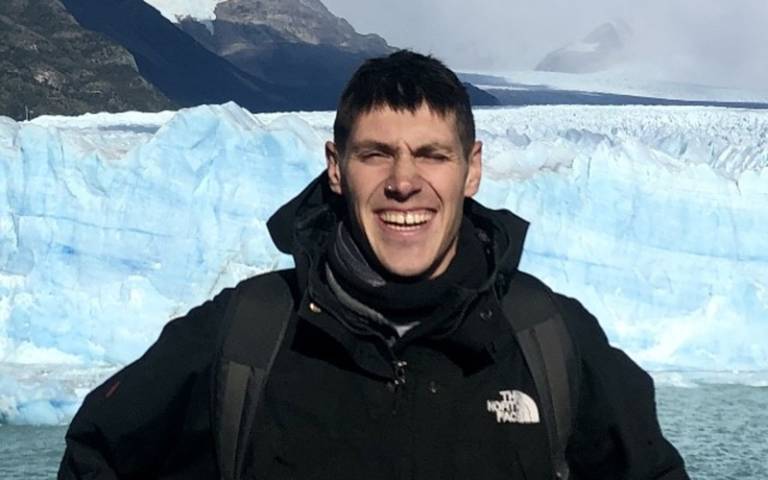Jimmy Gibson is an Education and International Development: Conflict, Emergencies and Peace (CEP) MA student, class of 2024. He tells us about his experience studying at IOE.
 What is your educational background?
What is your educational background?

I completed a Bachelor’s degree in Chemistry in 2017, however, wanting to travel, I completed a qualification in English Language Education, which allowed me to travel and work globally for 4 years.
I was looking to continue in a career that had an international focus and engage more with development when I came across the course at UCL IOE.
“As a renowned institution, it could offer me the credentials to move into a career I desired.
What are your motivations for pursuing a graduate-level qualification?
I have wanted to work in the International Development sector for a while, and do something that made a difference and helped people. As the world of International Development is highly competitive, an MA seemed like the ideal qualification to progress. Additionally, the scope for learning in a degree is unparalleled.
“I had missed the process of education – studying, reading, debating – and I felt like I was ready to challenge myself once again.
Why did you apply to UCL for graduate study?
As my main motivations were careers based, I would be lying if I didn’t say that the impressive league table position wasn’t a major influencing factor in my decision to study here. I had hoped that if any qualification could get me to where I wanted to be, it would be one from UCL.
Additionally, my brother had completed an MSc at UCL 2 years prior. He was incredibly complimentary on the positive learning environment and massive resources the university had available. He talked of inspiring lecturers, who knew not just content, but how to share it with passion.
What is the best thing about your course?
The best thing about my course is the unknown. It is said that the more you learn about something, the less you know, and that is definitely the case in my course. I had previously considered myself fairly knowledgeable in all things related to development, international relations, and peacebuilding – oh how wrong I was.
The course introduced me to a wealth of scholarship and theory that I was previously ignorant to, and I’m still discovering new ideas with every seminar or reading. It’s amazing how what I previously thought was a fairly niche corner of academia has such expertise and specification. The course has allowed me to forge my own path, piquing my interest in policy and security, an area I had never even considered prior to enrolling.
Ultimately, I love the range and breadth of study; for my units thus far, I have written pieces on Kosovo, Bolivia and Ethiopia, three countries I’ve only ever seen on the TV.
“For a kid from Northern England, I’m often surprised at the global nature of the knowledge I’ve gained here.
What do you find interesting about your field of study and what inspires you?
As a field of study and research, Western intervention has really interested me. I have always been critical of the role Western governments have played in other nations, both militarily and through bilateral aid, but it has been incredibly interesting to study this through the contexts of education, conflict, and development. I feel my arguments and opinions are now much more balanced, as well as informed.
What are your career plans once you’ve completed your current programme of study at UCL?
I’m looking to work in a thinktank or a consultancy based in the EU or the UK, analysing policy and practice to work towards conflict reduction.
Do you think studying at IOE is a good investment?
If you take advantage of what is available, societies, internships, writing workshops, the payoff is immense.
My opinion might be slightly biased here, as I applied for a summer internship with the UCL International Development Hub, which means I’m spending one month on an Indonesian island, with all flights, food and accommodation paid for by the university.
What's the most valuable element of your degree?
The links to the professional sector are the most obviously valuable credential – we have had many seminars and lectures led by NGO practitioners. This goes hand in hand with the personal connections of the academic staff, many of whom have long and illustrious careers in the field.
“What has most impressed me though, is the passion for “best practice” evident in all staff.
It is acknowledged by all staff that poor philanthropy is often more harmful than doing nothing at all, and as such, there is a genuine effort to make sure that the cohort is ethically engaged with development in the correct manner. They recognise that we will be future practitioners, and that their lessons will have long lasting results.
Is there anything else you would like to say about your time at IOE?
If you commit, embrace the university and throw yourself into learning, you’ll have more than just a piece of paper when you graduate.
Last updated 24 March 2023.
 Close
Close


